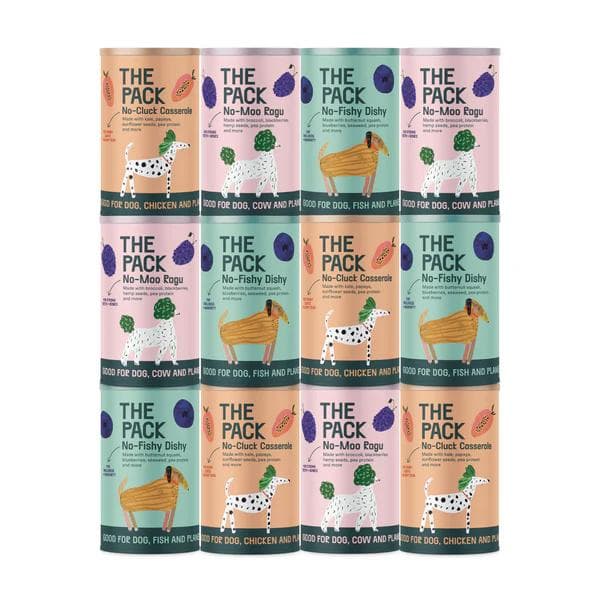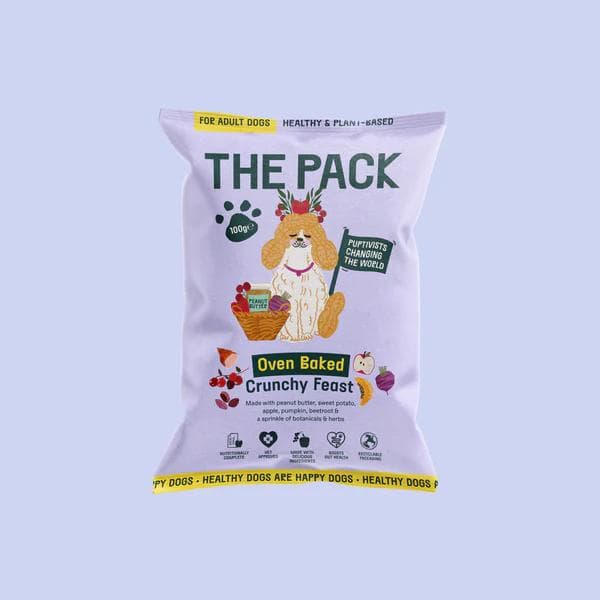Key Takeaways
- If a vegetarian diet is made appropriately, it can be a good option for older dogs. It must meet all of their age- and health-specific nutritional demands to keep them healthy.
- Age-specific nutrition is the most important thing for senior dog health: Older dogs need diets that are good for their lower activity levels, help them digest food better, and support their joints better, whether they are plant-based or not.
- Plant-based proteins can suit the dietary needs of older dogs quite well. Lentils, chickpeas, quinoa, and soy are all good sources of protein that can offer important amino acids when they are carefully balanced for absorption and quality.
- Plant-based supplements can help keep your joints healthy. For example, glucosamine, chondroitin, and omega-3 fatty acids from algae or flaxseed can help keep you moving and lower inflammation.
- Following AAFCO criteria is very important for vegetarian diets: Make sure to choose vegetarian formulas that fulfil the Association of American Feed Control Officials (AAFCO) standards to make sure the diet is complete and balanced.
- Make the change slowly to prevent upsetting the stomach and make sure your dog accepts it: Give your senior dog 7–10 days to become used to eating plant-based foods. This will help them adjust and keep their digestive health.
- Vegetarian diets can help with weight management: Many plant-based foods are naturally lower in calories, which helps senior dogs stay at a healthy weight while keeping their energy levels up.
- Supplements fill up frequent nutritional gaps: To avoid nutrient shortages that are frequent in vegetarian diets, you should take taurine, L-carnitine, and vitamin B12.
- Ask your vet for personalised advice: To make sure the diet is safe and beneficial for each senior dog, it should take into account things like breed, activity level, and any medical concerns they already have.
A vegetarian diet for older dogs, with the help of a vet, can be both healthy and moral. It can help with digestion, joint health, and overall health.
Introduction
As pets become older, their nutritional needs change, so you need to make sure you make the right changes to keep them healthy and happy. Traditional dog food is high in animal-based proteins, but vegetarian diets have become a good option for senior dogs when they are carefully planned to match their specific needs.
For older dogs, it's not enough to just eat less; they also need to get the right balance of nutrients to help their digestion, joints, and energy levels. Can a diet that is mostly made up of plants give your older friend all the attention they need? The answer is to make a diet that has a good mix of high-quality plant proteins and supplements that fill in any gaps.
In this article, we'll look at what senior dogs require when they switch to a vegetarian diet and how to make sure that their new diet meets their health needs without hurting their health or energy.
Learning About the Nutritional Needs of Older Dogs
As dogs become older, their bodies and metabolisms change, thus they need to modify their diets. Senior dogs, who are usually those above seven years old, have slower metabolisms, less energy, and organs that work less well over time. Because of this, their diet needs to change to fight the consequences of ageing.
It is important to cut back on calories, but the quality of the nutrients, especially proteins, becomes even more important. For instance, elderly dogs need high-quality, easy-to-digest protein to help them keep their muscles and immune system strong. You also need to keep an eye on the phosphorus content, which is important for renal health, which is more fragile as you get older.
Senior dogs are more likely to get health problems like arthritis, memory loss, and problems with their digestive system, in addition to proteins. Vitamins, minerals, and fatty acids are all very important for reducing these problems. In this light, a vegetarian diet that takes these nutritional needs into account can be a healthy and realistic option.
It's crucial to know that your nutrient density demands usually go up even while your calorie needs go down. This contradiction shows how important it is to make senior diets, whether they are vegetarian or not, to make sure they are as bioavailable and effective as possible. Changing to a plant-based diet must meet these changing needs with the same amount of care and accuracy.
The Science Behind Vegetarian Dog Food
Dogs are naturally omnivores, so they can eat plant-based diets as long as they are nutritionally complete. Vegetarian diets for dogs use scientific ideas such balanced amino acid profiles, enough calorie density, and accessible nutrients to try to duplicate the benefits of traditional meals.
Studies show that dogs can fare well on vegetarian diets. When vegetarian dog food meets AAFCO criteria, studies in the Journal of Animal Science indicate that dogs obtain all the nutrients they need, keep their bodies healthy, and live a long time. Plant proteins are very flexible, so senior dogs can get the amino acids they need by eating things like legumes and healthy grains together. For instance, lentils and quinoa or soy together have protein profiles that are similar to those seen in animal products.
But you should think about how easy it is to digest, especially for older dogs with delicate stomachs. Modern food technologies make nutrients more available by breaking down plant proteins or adding critical vitamins and lipids to recipes that don't have enough of them in plant-based sources.
By carefully adding new information on plant-based dog nutrition, today's vegetarian meals are just as good as traditional ones in meeting the demands of older dogs.
Why Senior Dogs Should Eat Vegetarian Diets
A diet focused on plants has unique benefits for older dogs. These benefits are directly related to the health problems that elderly often have:
- Regulating digestion: Legumes, vegetables, and grains are high in fibre, which helps peristalsis and feeds good bacteria in the gut, which helps digestion.
- Heart health: Plant-based diets include less saturated fat and more antioxidants, which protect the heart.
- Kidney support: Most plant meals are alkaline, which means they lessen the amount of acidifying metabolic waste that the kidneys make, which helps them work better as they age.
- Better joint health: Omega-3 fatty acids from algae and flaxseeds, coupled with veggies high in antioxidants, help fight inflammation and pain caused by arthritis.
- Weight management: Ingredients that are naturally lower in calories can help keep senior dogs from becoming overweight, which is a typical problem, while still giving them the energy they need to accomplish their daily activities.
Because of these benefits, as well as the fact that it is more sustainable and ethical, vegetarian nourishment is a good choice for older dogs and their owners.
Important Nutrients for Older Dogs Who Eat Vegetarian Food
When making a vegetarian diet for older dogs, you need to be careful to meet their special nutrient demands. Some important things to think about when it comes to nutrition are:
- High-quality proteins: Use lentils, chickpeas, and quinoa together to get all the amino acids you need.
- Vitamin B12: Since this vitamin is mostly found in animal products, vegetarians must take supplements.
- L-carnitine and taurine: These are very important for heart health and are easy to get if you don't eat enough plant-based meals.
- Omega-3 fatty acids: These include DHA and EPA from algae, which help the brain and joints work better.
- Balance of calcium and phosphorus: The right amounts are very important for keeping elderly dogs' bones and kidneys healthy.
- Pairing iron with vitamin C: Adding foods high in vitamin C, including bell peppers, can help the body absorb iron.
All of these things are important for making sure that a plant-based diet is not only good enough, but also the best for older dogs.
Plant-Based Protein Sources for Older Dogs
Vegetarian diets for dogs still rely heavily on plant proteins. To get the most nutrients from these protein sources, put them at the top of your list:
- Chickpeas and lentils: These are high in protein, fibre, and important minerals like iron and potassium.
- Quinoa: This plant-based "complete protein" is hard to find since it has a whole amino acid profile and is easy to digest.
- Soy protein isolates are a high-quality source of concentrated protein that helps keep muscles.
- Pea protein: When mixed with cereals, it gives you a good mix of amino acids.
- Hemp protein: This type of protein has omega-3 fats that are good for you and help reduce inflammation in your joints.
Senior dogs can have a strong and diverse vegetarian diet by using these protein sources.
In conclusion,
Switching older dogs to a vegetarian diet not only addresses their changing nutritional needs, but it also gives them health benefits that are specific to the problems that come with getting older. Plant-based meals can be a safe and successful choice for older dogs if they are carefully planned. They can help with anything from protein quality to joint health.
The science behind vegetarian dog food shows that by warding against health problems, canines may flourish on plant specially formulated plant-based components. Improvements in food processing and supplements make sure that these meals meet—and often exceed—the needs of older dogs.
Prepared and nutrient-rich vegetarian feeds can change how we care for ageing dogs in the future. They can help dogs live longer and healthier lives while also following ethical and sustainable principles. For responsible pet owners, these diets are not just an option, but also a smart way to feed older dogs. Talk to your vet about how to make the strategy work for your dog's specific health needs, and be open to the idea of a plant-based diet in their latter years.






